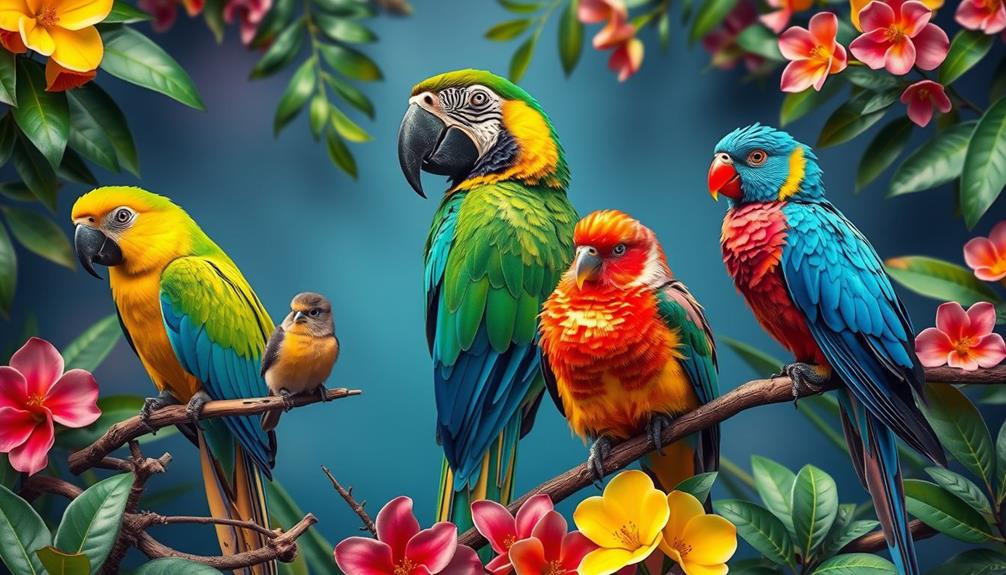If you're looking to explore unusual pet birds beyond parakeets and cockatiels, consider options like the vibrant Hyacinth Macaw and intelligent African Grey Parrot. These birds have distinct personalities and different care needs. For something quieter, the gentle Pionus Parrot or lively finches might suit your home. Remember, each species comes with specific dietary and social requirements. Engaging with them daily is crucial to keep their spirits high. Plus, understanding their lifespan and health needs helps you provide the best care. Keep going to discover even more unique bird options and essential care tips!
Key Takeaways
- Hyacinth Macaws are the largest parrot species, known for their impressive size and lifespan of over 60 years, making them a unique pet option.
- African Grey Parrots are highly intelligent with extensive vocabularies, requiring social interaction and mental stimulation to thrive as pets.
- Pionus Parrots are gentle and quieter, measuring 10 to 12 inches, suitable for families seeking a less demanding bird companion.
- Cockatoos can live between 30 to 70 years and require significant social interaction; they can develop strong bonds with their owners.
- Finches and Canaries are vibrant, social birds that thrive in flocks, offering lively companionship with their singing abilities and colorful appearances.
Unique Bird Species to Consider
When you're considering adding a feathered friend to your home, there are some unique bird species that stand out. The Hyacinth Macaw, the largest parrot species, can reach up to 40 inches and live over 60 years with proper care.
If you're looking for intelligence, African Grey Parrots are renowned for their extensive vocabulary and need for social interaction and mental stimulation, thriving for 40 to 60 years.
Additionally, understanding dog health and nutrition is essential for a well-rounded pet care approach.
For first-time owners, Pionus Parrots might be the best choice. They're gentle and quieter, measuring 10 to 12 inches and living 20 to 40 years.
If you prefer smaller companions, Finches are social birds that thrive in flocks and offer vibrant colors but require less human interaction. They typically live 5 to 10 years.
Don't overlook Canaries, either! Known for their beautiful singing, especially the males, they come in over 200 breeds and flourish in spacious cages. Their lifespan ranges from 5 to 15 years.
Each of these unique bird species offers something special, ensuring you'll find a feathered friend that fits your lifestyle.
Understanding Bird Care Requirements

When caring for unusual pet birds, it's essential to provide them with the right diet and ample social interaction.
Each species has specific dietary needs, whether it's pellets, fresh produce, or limited seeds, so you'll need to plan their meals carefully. Incorporating elements of mindful eating practices can also be beneficial for their overall health.
Additionally, these birds thrive on companionship, meaning you'll have to dedicate time to engage with them daily.
Essential Diet Considerations
Providing a balanced diet for your pet bird is essential to its health and well-being. For larger birds like African Greys and Macaws, focus on a proper diet rich in calcium and vitamin D. Include high-quality pellets, fresh fruits, and vegetables, along with fresh leafy greens and nuts.
Additionally, consider incorporating vegan alternatives to provide nutritious options that support their long lifespans, which can exceed 30 years.
Smaller birds, such as Budgerigars and Canaries, also need a varied diet, incorporating fresh veggies and a small amount of seed. Make certain they've access to clean, fresh water daily.
Cockatiels thrive on a diet that includes pellets, fresh produce, and occasional treats like cooked grains or legumes to guarantee they receive a full range of nutrients.
Social Interaction Needs
To guarantee your unusual pet bird thrives, understanding its social interaction needs is essential. Many birds, like African Grey Parrots and Conures, require 2-4 hours of daily engagement to stay happy and prevent behavioral issues.
Additionally, incorporating activities such as yoga for back pain management can help create a calming environment for both you and your bird. African Grey Parrots, known for their intelligence, need mental stimulation through complex toys and training exercises to keep them engaged.
Lovebirds are particularly social and can develop jealousy or aggression if they feel neglected, making consistent companionship critical for their well-being.
Similarly, Conures are playful and affectionate, needing daily interaction to maintain positive behavior and avoid destructive tendencies.
While Finches and Canaries don't require as much human interaction, they still thrive in social environments. Ideally, you should keep them in pairs or small groups to meet their social needs.
Social Needs of Uncommon Birds

When you bring an uncommon bird into your home, understanding its social needs is essential.
Each species has unique social behaviors and interaction requirements that can greatly impact their well-being. Engaging in play activities that mimic their natural behaviors can help foster a sense of security and companionship.
Unique Social Behaviors
Understanding the unique social behaviors of uncommon pet birds is vital for their well-being. African Grey Parrots, for instance, showcase advanced emotional intelligence and require significant daily interaction. Studies indicate that similar to how cats display affection, these birds can form strong bonds with their owners. Without this companionship, they might develop behavioral issues like feather picking.
Lovebirds also highlight the importance of bonding; they thrive in pairs and can become stressed or aggressive if kept alone.
Caiques are incredibly playful and energetic, demanding at least 2-4 hours of interactive playtime each day to maintain their mental well-being. Their social nature makes engaging activities essential for their happiness.
Pionus Parrots enjoy socializing but can entertain themselves, making them suitable for owners with limited interaction time, provided they offer a stimulating environment.
Conures, on the other hand, are highly social and affectionate. They flourish with companionship and require regular mental stimulation to prevent boredom-related problems.
Interaction Requirements
Uncommon pet birds have distinct interaction requirements that are crucial for their emotional and mental health.
These birds thrive on socializing and need your attention to prevent behavioral issues. For instance, African Grey Parrots generally require around 5 hours of daily interaction, while Pionus Parrots enjoy 2-4 hours.
Additionally, understanding how astrology shapes personal confidence can also help you connect better with your feathered companions. Cockatoos, known for their affectionate nature, can develop depression if they lack companionship.
To keep your feathered friends content, consider these key points:
- Daily Interaction: Confirm you dedicate sufficient time each day to engage with them.
- Playful Activities: Incorporate toys and games to stimulate their minds and encourage social behavior.
- Emotional Engagement: Build a strong bond through affection and regular handling.
Companionship Preferences
Many pet owners overlook the unique companionship preferences of exotic birds, which play an essential role in their well-being. Understanding the social needs of these birds helps guarantee their happiness and reduces the risk of behavioral issues.
Here's a quick comparison of some unusual pet birds and their companionship preferences:
| Bird Type | Companionship Preferences |
|---|---|
| African Grey Parrots | Thrive on mental stimulation and bond with one owner. |
| Conures | Need daily socialization and can be very affectionate. |
| Lovebirds | Best kept in pairs; risk aggression if neglected. |
| Pionus Parrots | Independent; can entertain themselves. |
| Doves | Low-maintenance companions that enjoy gentle handling. |
For instance, African Grey Parrots require significant social interaction to flourish, while Conures need ample playtime to prevent boredom. Lovebirds should ideally be kept in pairs to fulfill their social needs. Meanwhile, Pionus Parrots and Doves cater to those seeking affectionate yet low-maintenance companions. By recognizing these companionship preferences, you can create a more fulfilling environment for your exotic pet.
Training Techniques for Pet Birds

Training your pet bird can be a rewarding experience that strengthens your bond and enhances their well-being. Effective training techniques, like positive reinforcement, are essential for all species, including those with strong mimicry abilities, such as African Grey Parrots and Budgerigars.
Just as foraging can enrich a bird's diet with the transformative potential of wild edibles in cooking, incorporating a variety of activities can enhance their mental engagement. Aim for daily training sessions lasting 10-15 minutes to keep your bird focused and engaged.
Here are some training techniques to take into account:
- Clicker training: Use a distinct sound to mark desired behaviors, helping your bird understand what's being rewarded.
- Socialization: Incorporate engaging interaction to prevent boredom and behavioral issues, especially for social species like Conures and Cockatoos.
- Mental stimulation: Tailor activities to your bird's specific traits, ensuring they receive the cognitive challenges they need.
With consistent training, you'll not only develop a deeper bond but also promote a happier, healthier pet.
Health and Lifespan Insights

When considering an unusual pet bird, it's important to understand their health needs and lifespan expectations. Many birds, like African Grey Parrots, can live an astonishing 40 to 60 years, making them a significant long-term commitment. Cockatoos may live 30 to 70 years, so think carefully before adopting one. In contrast, lovebirds have shorter lifespans of 10 to 15 years, but proper care can enhance their longevity.
Here's a quick comparison of some unusual pet birds:
| Bird Species | Lifespan (Years) |
|---|---|
| African Grey Parrots | 40 to 60 |
| Cockatoos | 30 to 70 |
| Lovebirds | 10 to 15 |
| Hyacinth Macaws | 60+ |
Regular veterinary check-ups and a balanced diet are essential for preventing health issues and ensuring a longer lifespan. Hyacinth Macaws, being the largest parrot species, require ample space and social interaction to thrive. By understanding these aspects, you'll be better equipped to provide the care these beautiful creatures need throughout their lives.
Misconceptions About Exotic Birds

Misconceptions about exotic birds can lead to misunderstandings that affect both the birds and their potential owners. Many first-time bird enthusiasts think that species like African greys or macaws are suitable for beginners, but these exotic birds need extensive social interaction and mental stimulation, similar to the careful considerations required in reviving old friendships.
Underestimating their care requirements can lead to unhappy birds and frustrated owners.
Here are some common misconceptions:
- Lovebirds need a partner: While they thrive on companionship, lovebirds can bond closely with humans if socialized properly.
- Cockatoos are quiet pets: This is false; they can be quite vocal and may exhibit destructive behaviors if not given enough attention.
- All parrots can talk: Not all species, like finches and canaries, are known for vocal mimicry. They provide companionship through their singing instead.
It's also a myth that exotic birds only live a few years. Species like African greys can live 40 to 60 years, making them a long-term commitment.
Understanding these misconceptions is essential for ensuring a fulfilling relationship with your feathered friend.
Frequently Asked Questions
What Is the Most Unique Pet Bird?
When considering unique pet birds, you might find the Hyacinth Macaw stands out. Its striking appearance, impressive size, and sociable nature make it a fascinating companion, though it does require considerable space and commitment from you.
What Other Birds Can Live With Cockatiels?
You can house cockatiels with budgies, lovebirds, and finches, ensuring you introduce them gradually. Just avoid larger, aggressive birds. Provide enough space and supervision to keep interactions safe and harmonious for everyone involved.
What Is the Most Exotic Bird You Can Own?
You might find the Hyacinth Macaw intriguing; it can grow up to 40 inches long! Exotic birds like this require dedication, but their beauty and companionship can truly enrich your life for decades.
What Is the Friendliest Bird to Have as a Pet?
If you're looking for the friendliest bird, consider a cockatiel or a lovebird. They bond easily with owners, showing affection and playful behaviors that make them wonderful companions for you and your family.
Conclusion
In the colorful world of pet birds, there's so much more than just parakeets and cockatiels waiting for you to discover. By understanding their unique needs and quirks, you can create a vibrant bond with these feathered friends. Don't let misconceptions clip your wings; plunge into the joys of caring for an exotic bird. With love and patience, you'll find that each chirp and flutter adds a sweet melody to your life, transforming your home into a lively aviary.









